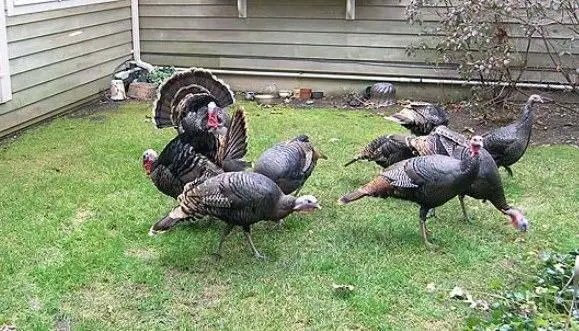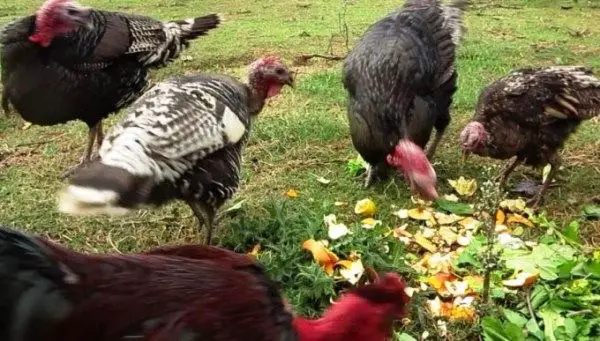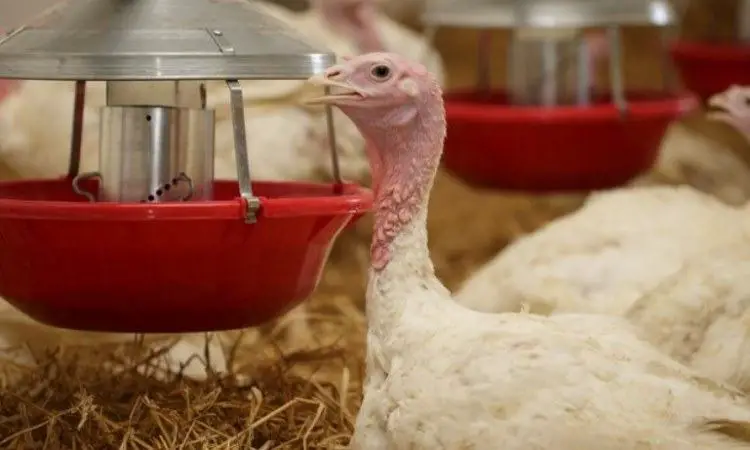No products in the cart.
Turkey
What To Feed A Turkey?
Turkeys can be a fun addition to a backyard flock if you are looking for company, nutritious meat, and eggs. Generally, a turkey needs more protein than a normal chicken. Check out my article below to know about turkey feed and effective methods to raise a fat and healthy flock.
*This post may have affiliate links, which means I may receive commissions if you choose to purchase through links I provide (at no extra cost to you). As an Amazon Associate I earn from qualifying purchases. Please read my disclaimer for additional details.
The nutritional needs of a turkey
At different growth stages, the feed needs to be changed to meet nutritional requirements.
- Newly hatched poults (0 – 6 weeks): need a high protein diet, about 28% with proper levels of lysine as well as methionine which are two essential amino acids for the first feather growth.
- Growing turkeys (first feather growth to sexual maturity): require a lower protein, accounting for 20% level of feeding. The amount of calcium and phosphorus must be balanced for adequate bone development.
- Mature turkeys: should be decreased to 17% in protein level, as found in maintenance feed.
Grow market birds require high energy level feeds. However, when feeding potential breeding stock, in order to avoid body fat in birds, the feed should contain a large amount of fiber. When it comes to breeding turkeys, diets with high protein will negatively affect the hatchability of eggs.
It is not recommended to use chicken layer diets for breeding turkeys as turkeys have a different calcium-to-phosphorus ratio in their diet. Plus, they need higher levels of vitamin and trace mineral than normal levels of the other required minerals in chickens’ diets.
Furthermore, turkeys need vitamin, mineral supplements, and probiotic in their feed formulas. Vitamin C and Vitamin E have particularly important roles during stressful times. Vitamin E benefits the body as a fat-soluble nutrient while vitamin C works as a water-soluble vitamin. These two vitamins are exactly a perfect match to work together.
Turkey feed to provide
Turkey can eat a variety of foods, which can be mixed for specific requirements of nutrients.
In fact, they can consume pre-formulated food, natural food, or just graze on pasture.
1. Grazing on pasture
Intake from pasture or range grass (grass from 4 – 6 inches long) accounts for 50% of their diets.
Wild turkeys often forage near wooded areas. Therefore, you should provide them with ground feeding areas or platform feeders which is large, low enough to accommodate these large birds.
However, turkey can destroy turf or lawns while scratching. So, it is better to plan a feeding area in a spot that you do not mind getting torn up or trampled.

2. Pre-formulated food
Pre-formulated food is the most complete, nutritious feed available. Feeding a pre-formulated feed for turkeys to make sure they have adequate protein, vitamins, and minerals for life, growth, production, and reproduction.
For meat birds, rations are typically formulated to achieve good health and maximum productivity but not too fast to cause any health-related issue.

3. Natural food
In the wild, turkeys forage regularly and will eat many various kinds of natural food such as insects, fruits, berries, nuts, seeds, plants, and small vertebrate animals.
Turkeys often mainly rely on acorns during the winter season because other alternative food sources may be rare.

Some farmers allow turkeys to forage freely through pastures and fields or sprinkle vegetable scraps, or toss a handful of mealworms in order to encourage them to forage.
A simple tip you need to keep in mind is that your turkey can access fresh, clean, and available water at all times.
Read More: What is a Good Food Plot for Turkey? If you’re looking to attract wild turkeys or give your farmed turkeys a better diet, these plots can help!
Fatten up a turkey
Some efficient methods that can be used to ensure a fattened, juicy meal are adding corn and oats to your turkeys’ diets, giving them high protein feed, and keeping feed located in one place.
It is advised to use a 30% protein gamebird feed for fattening up a turkey. Besides commercial feeds that contain high levels of protein, turkeys can be supplied with alfalfa hay as their main feed. In contrast, inadequate or excess protein may be detrimental to the health of turkeys.
Plus, corn contributes to weight gain but typically results in birds gaining fat and not muscle. Oats have a protein level of 11 – 14% and are one of the best feed to turkeys. It is good to offer your turkeys a variety of grains to encourage them to eat more.
Moreover, since wandering around all day can burn the calories of turkeys, you should keep all of the food and water in one location to access easily.
Conclusion
The role of feeding, especially what to feed a turkey, should not be overlooked when raising turkeys. They are large birds with healthy appetites, thus you can sate their appetites by a wide range of different foods.

